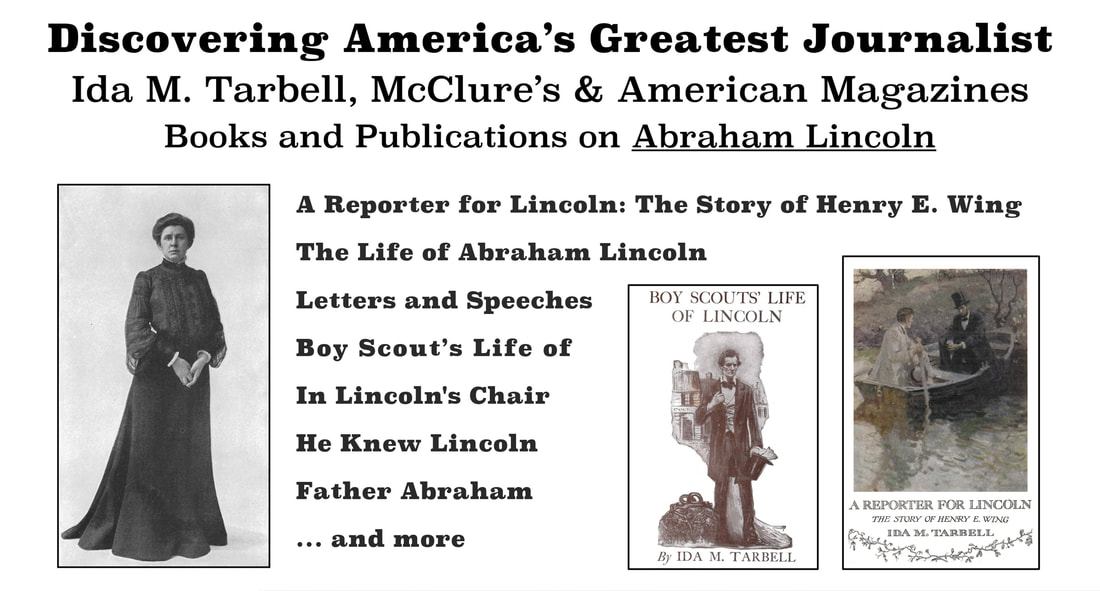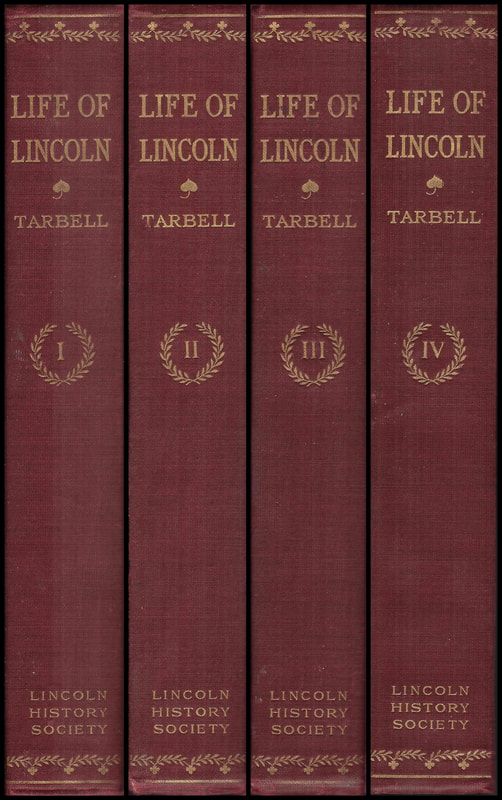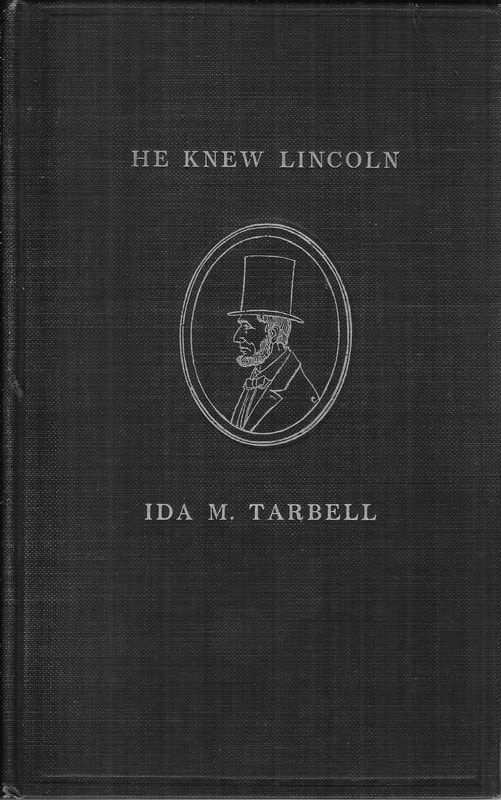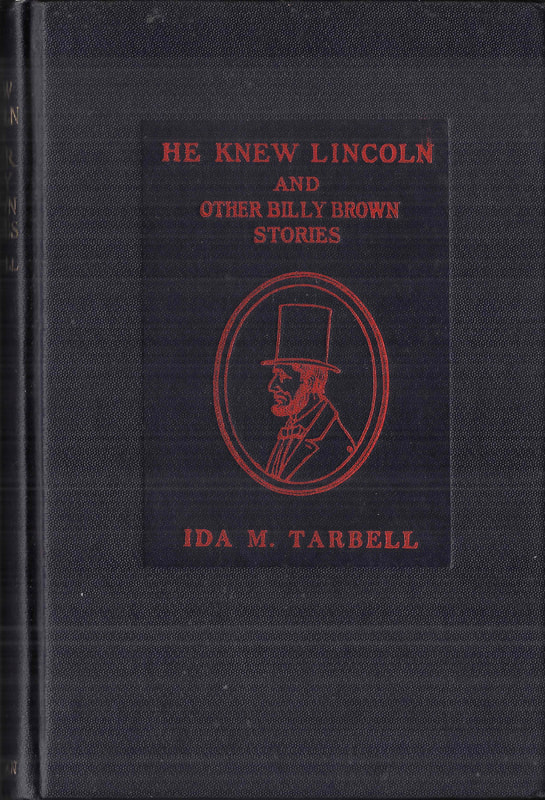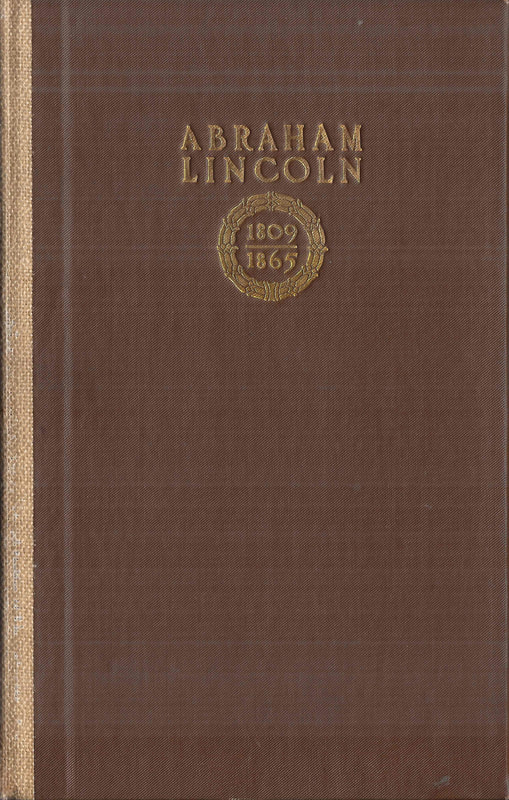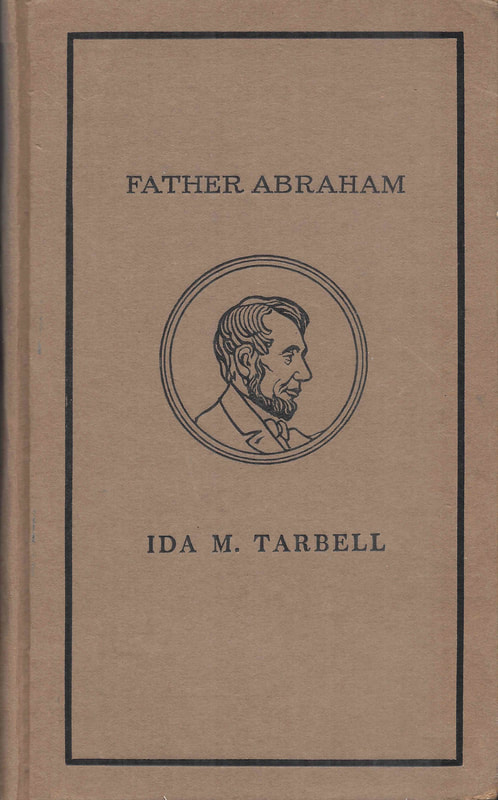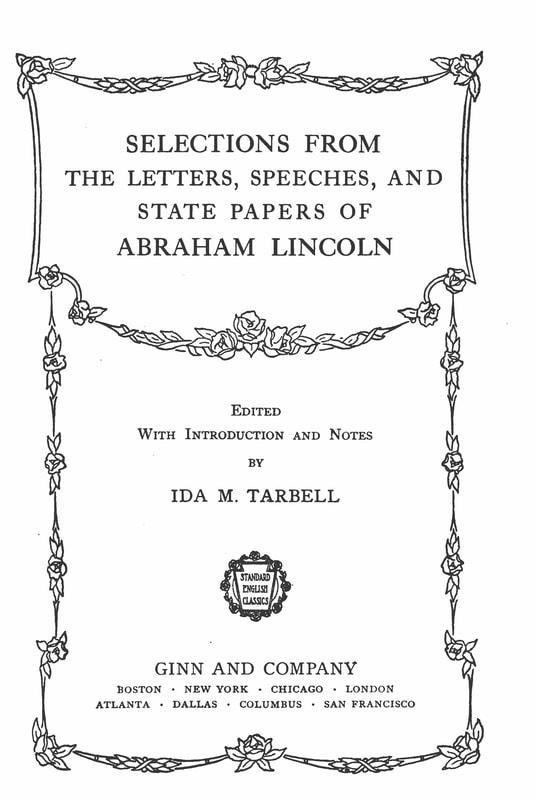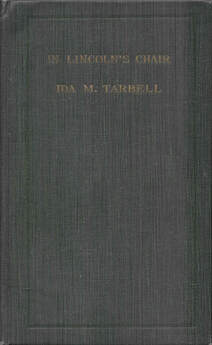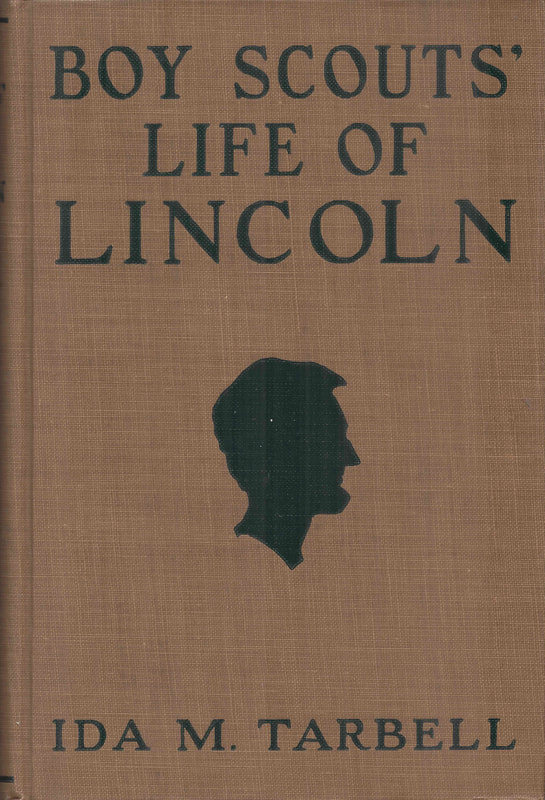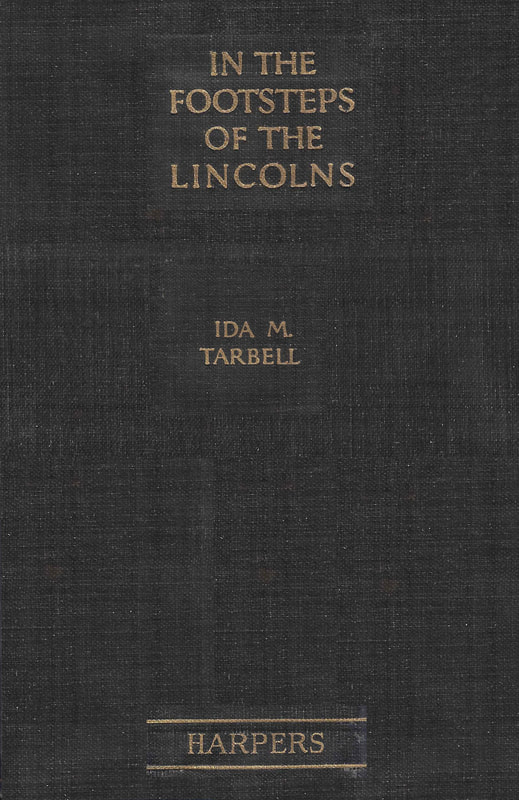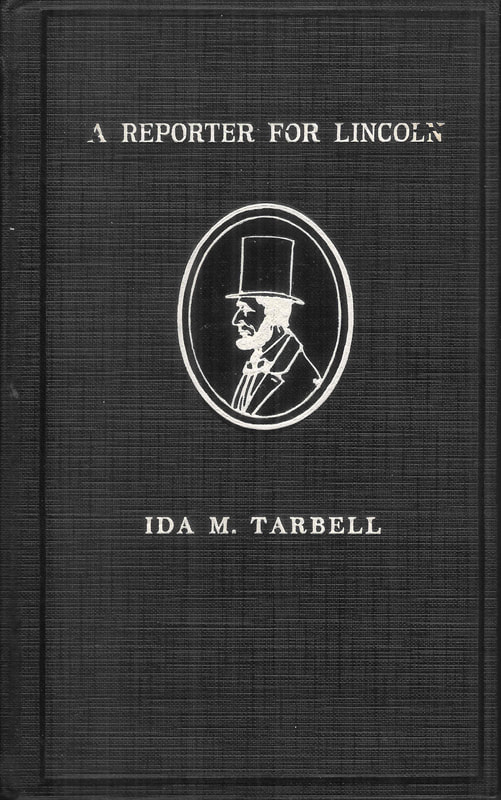Ida M. Tarbell's Abraham Lincoln Bibliography
|
|
Date Published: July 4, 2021
Date Modified: June 30, 2024 |
Miss Tarbell demonstrated the value of on-going research that incessantly seeks and welcomes new knowledge. Her entire journalistic career she researched, wrote and published material about Lincoln: a series of articles over four years for McClure’s Magazine, several collections of finely-tuned biographical sketches such as a Boy Scouts’ Life of Lincoln, multiple human-interest novellas such as A Reporter for Lincoln: The Story of Henry E. Wing, and a four-volume masterpiece entitled The Life of Abraham Lincoln.
Listed below are a majority of her works on Abraham Lincoln.
Listed below are a majority of her works on Abraham Lincoln.
Ida M. Tarbell's Publications on Abraham Lincoln
|
|
"The Life of Abraham Lincoln" (IV Volume Set)
|
Ida Tarbell is one of the greatest authors and journalists of America. This is an amazing work from 1895 by a wonderful talent.
She was the editor for The Chautauqua, a writer for McClure's Magazine, a biographer of Abraham Lincoln, Owen D. Young (CEO of General Electric) and Elbert H. Gary (The Story of Steel). Her work on John D. Rockefeller Sr. in the "History of the Standard Oil Company" for McClure's earned her the title of muckraker and has probably more than anything else written her name in American history. I started out this set of books by reading Volume IV first. I still have Volume I to read, but it may be a while. I know, though, that it will be as captivating as IV, III and II (yes, I read them in that order). In Volume IV, I was in tears reading how the country lined the railroads as the train passed by carrying the president's coffin.
|
The story of his visiting the confederate soldiers in the hospitals of Washington D.C. shortly before his assassination and those same young men breaking down in tears at hearing of his death—if read by every person today—would go a long way to healing the wounds of our civil war.
An excellent read that deserves to be on the reading list of anyone running for President of the United States.
An excellent read that deserves to be on the reading list of anyone running for President of the United States.
"He Knew Lincoln"
|
Another work by Ida Tarbell about Abraham Lincoln from 1907. It is a short read of only 40 pages.
These are stories of President Lincoln as experienced by Billy Brown who considered himself a close friend of "Mr. Lincoln." The climax of the book is a meeting between Billy and Mr. Lincoln at the White House. He stays for supper and they go out back to sit and talk until late in the night. Billy feels bad that he is taking up so much time of Mr. Lincoln and says he needs to go catch the train. Unexpectedly, President Abraham Lincoln takes the walk with him. On the way to catch the train, the president shares with Billy his deepest thoughts: "Many a night I can see the boys a-dyin' on the fields and can hear their mothers cryin' for 'em at home, and I can't help 'em, Billy. I have to send them down there. We've got to save the Union, Billy, we've got to." |
If anyone wants to know what President Lincoln bore every day of his life in office, this is the book.
"He Knew Lincoln and Other Billy Brown Stories"
|
This is a follow-on collection of stories from He Knew Lincoln, and it is just as moving and informative. Billy Brown's stories grow from the 40 pages (He Knew Lincoln) to 179 pages. This novella includes reminiscences of Billy about the Lincoln-Douglas debates of 1858.
One of the moving exchanges is between Billy and Senator Douglas when the Senator asks him, "Billy, you supported Mr. Lincoln didn't you?" The impact of the question is more understandable as one reads In the Footsteps of the Lincolns that Abraham Lincoln actually won the popular vote in the Election of 1858 by a majority of nearly 4,000 votes. The people of Illinois had heard the debates and decided on the winner, but Lincoln had not won the election because Douglas had a majority of eight in the legislature.
|
In a moving section entitled "In Lincoln's chair" the reader finally gets to hear what President Lincoln shared with his friend, Billy Brown, on a dark night overlooking Washington D.C.
"Abraham Lincoln" for a Republican Club Dinner
|
This collection of three articles was published as a souvenir for the Lincoln Dinner of the New York City Republican Club in 1907. It contains three articles:
In this collection "The Battle of the Giants" is an amazing account of the Lincoln-Douglas debates during the senatorial campaign of 1858. If you want to understand the emotion surrounding these elections, and how involved the American people were with slavery and the preservation of the Union, this is the story to read. |
In "The Parents of Abraham Lincoln," Miss Tarbell traces the ancestry of President Lincoln on both parents sides to confirm - finally (?) - his ancestry. This is a preview of the massive work she undertook in 1924 to publish even further documentation In the Footsteps of the Lincolns.
"Father Abraham"
|
In He Knew Lincoln, Ida Tarbell shares a time when Billy and Lincoln sat and looked out over Washington.
He says that the President, "just opened up his heart." He shared all his thoughts, fears and anxieties. When Billy tried to share what Lincoln had said with his wife, she "cried, so I gave it up." Billy now shares Lincoln's words from that night. Abe says, "Nothing but darkness and blood and groans and torture. Sometimes I can't believe it's true. Boys from Illinois where I live, shootin' boys from Kentucky where I was born! It's only when I see them comin' in I realize it - - boat load after boat load, wagon load after wagon load. "It seemed sometimes after Bull Run and Fredericksburg and Chancellorsville if they didn't stop unloadin' 'em I'd go plumb crazy. |
"But still they come, and only God knows when they'll stop. They say hell's like war.
"Billy. If it is, - - I'm glad I ain't Satan."
"Billy. If it is, - - I'm glad I ain't Satan."
"Letters, Speeches and Papers of Abraham Lincoln"
|
This is a collection of letters, speeches and papers written by Abraham Lincoln. If a reader is of the type that wants to read for themselves what Lincoln thought on topics such as slavery, avoiding war, the responsibility of lawyers to their clients, or just read some of his great speeches such as "A House Divided Against Itself" or the "Gettysburg Address," this is the book.
Speeches include:
|
"In Lincoln's Chair"
|
An interview conducted by Ida M. Tarbell with Billy Brown while she sat in "Lincoln's Chair." Billy talks about Lincoln's pursuit of God in his life and the way of preachers in early America:
"[The preachers] didn't have a chance often at a congregation, and felt they must scare it to repentance if they couldn't do no other way. They'd work up people 'til they got 'em to shoutin' for mercy." The last two paragraphs of the book summarizes Billy's point: "How do you suppose a man—just a common man, like Abraham Lincoln, could ever have risen up to say anything like he did in '65 in his Inaugural if he hadn't known God: 'With malice toward none, with charity for all; with firmness in the right, as God gives us to see the right, let us strive on to finish the work we are in; to bind up the nation's wounds; to care for him who shall have borne the battle and for his widow and his orphan—to do which may achieve a just and lasting peace among ourselves and with all nations.' |
"That ain't ordinary human nature—particularly when it's fightin' a war—that's God's nature. If that ain't what Christ had in mind, then I don't read the Bible right. ... Fact is I never knew a man I felt so sure God approved of as Abraham Lincoln.''
"Boy Scout's Life of Lincoln"
|
This is a fun read of Abraham Lincoln's life obviously written for the Boy Scouts of America founded in 1910. It seems quite characteristic of Miss Tarbell to support such an institution with this book published in 1922.
What I found interesting reading this book is how much I either missed in Lincoln's life reading the "Life of Abraham Lincoln" or that further information is expanded on in this book. Then again, maybe it is just that it is written to a boy scout with the emphasis on character, getting things done, and not carrying grudges against people, that makes it more memorable. Because of the audience, she seems to share more of the stories that Lincoln told. I definitely laughed more reading this book. I found some of these insights quite pertinent:
|
"In the Footsteps of the Lincolns"
|
This book traces the seven generations of Lincolns in the Americas starting with Samuel Lincoln arriving as a boy of seventeen in Massachusetts. Again, Ida Tarbell attacks myths with facts: Thomas Lincoln, Abraham's father was not a shiftless vagrant, poor in mind and spirit but the child of a pioneering advancing army continually moving into the wilderness.
She dispels the myth that Abraham Lincoln's childhood and youth were passed in hopeless, sordid poverty and hardship. She writes, "There were poverty and hardship, but they were never hopeless, therefore never sordid. She also covers the early life of Lincoln through his election as president: Lincoln starting out for himself; surveyor, legislator and law student; Lincoln the politician; his term in Congress; leaving his party; leveraging a Congressional defeat to ride to the presidency |
"A Reporter for Lincoln"
|
This is the story of President Lincoln's friendship with a young man from Connecticut, who, after being wounded in action, became a reporter for the New York Tribune in the anxious days of 1864.
After young Henry Wing brought the President the first news of "the lost army" of Grant and the Battle of the Wilderness, Lincoln came to rely on him as a trusted friend to report on conditions among the men at the front. Miss Tarbell makes us see the harassed President, his anxious Cabinet, the weary armies, and the tension throughout the North from day to day as the war drags on. The story in the tradition of the books above by Ida Tarbell shows the great heart of Lincoln and the love and loyalty that inspired his unofficial reporter. As in He Knew Lincoln, there is an amazing story of President Lincoln with Henry Wing: |
Lincoln wanted to talk with him but there were too many people about, so the President took a hold of a rope to a small boat and asked Henry to get inside, pushed it away from shore and then said, "Now," drawing up his knees so they almost touched his chin, and clasping them with his long arms, "tell me about things. What have you been doing?"
I wish I could have been pulling the oars in that boat on that day!
I wish I could have been pulling the oars in that boat on that day!
